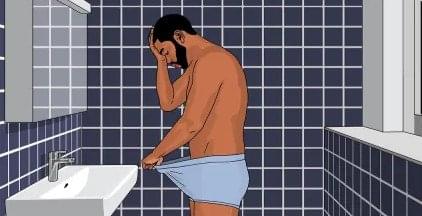Why is my penis smelly and sore?

Common causes for a smelly and sore penis include:
- smegma
- balanitis
- a sexually transmitted infection
- non-specific urethritis
- a urinary tract infection
- prostatitis
Smegma
If you do not wash your penis every day, a cheesy-looking substance called smegma can build up.
Smegma is a natural lubricant that keeps the penis moist. It’s found on the head of the penis and under the foreskin.
If smegma builds up in the foreskin, it can:
- start to smell
- prevent easy foreskin movement
- become a breeding ground for bacteria
Balanitis
Balanitis is a condition where the head of the penis becomes red and swollen.
It’s often related to a build-up of smegma, which can happen if you’re not washing your penis regularly.
As well as poor hygiene, balanitis can be caused by:
- an infection, such as thrush
- skin conditions, such as psoriasis
- irritation to the skin (for example, caused by soap, medicine or condoms)
Treatment for balanitis
Treatment for balanitis depends on what’s causing it.
A doctor may prescribe:
- a mild steroid cream or ointment
- an antifungal cream or ointment
- antibiotics
If you or your child keeps getting balanitis and medicine has not helped, circumcision (surgery to remove the foreskin) may be considered.
Things you can do to help with balanitis
If you have balanitis
Do
- wash your penis every day using just water or an emollient (moisturising treatment)
- gently pull back your foreskin and wash the area with warm water
- dry gently after washing
- if you use condoms, choose condoms for sensitive skin
- wash your hands before peeing or touching your penis
Don’t
- do not use soap or shower gel
If your child has balanitis
Do
- gently wash your child’s penis every day
- use warm water and then dry it gently
- if they wear nappies, change your child’s nappies often
Don’t
- do not use soap, bubble bath or baby wipes
- do not pull your child’s foreskin back if it’s fixed in place
Causes of balanitis
Causes of balanitis include:
- not washing your penis properly
- some young boys have a very tight foreskin (phimosis), which means they cannot pull it back to clean under it
- thrush
- a sexually transmitted infection (STI) such as gonorrhea or chlamydia – if a STI is suspected you may be referred to a sexual health clinic
- substances such as soap, shower gels or condoms may irritate the skin
- diabetes – high levels of sugar in your pee can cause thrush
Sexually transmitted infections (STIs)
An STI can sometimes cause a sore and smelly penis.
Some examples of STIs and their symptoms include:
- gonorrhea: this can cause an unusual white, yellow or green discharge from the tip of your penis, pain or a burning sensation when peeing, and inflammation of the foreskin
- chlamydia: this can cause a white, cloudy or watery discharge from the tip of your penis, pain when peeing and pain in the testicles
Non-specific urethritis
Urethritis is inflammation of the urethra, the tube running from the bladder to the tip of the penis.
It’s normally caused by an STI, but it’s called non-specific urethritis (NSU) if the cause is unknown.
NSU can make your penis sore.
Symptoms of NSU include:
- a white or cloudy discharge from the tip of your penis
- a burning or painful sensation when you pee
- the tip of your penis may feel irritated and sore
Urinary tract infections
A urinary tract infection (UTI) is a bacterial infection that develops somewhere in your urinary tract, such as the bladder (cystitis), urethra (urethritis) or kidneys (kidney infection).
A UTI can cause pain or a burning sensation in your penis when you pee.
Prostatitis
Prostatitis is a condition caused by inflammation or infection of your prostate gland.
It can cause pain in your penis, as well as your testicles, bottom (anus), lower tummy (abdomen) and lower back.
See a GP if you think you may have prostatitis. You may need prompt treatment with antibiotics.
Seek medical advice
If you have any symptoms of an STI or NSU, such as pain or unusual discharge, see a Doctor or visit an STI clinic as soon as possible.
Many infections are easily treated. For example:
- with medicines, such as antibiotics or antifungal creams
- by using simple self care measures, such as more frequent washing
If the skin of your penis is irritated, avoid anything that might make it worse, such as perfumed soaps and products.